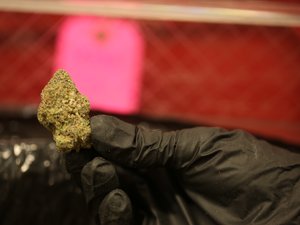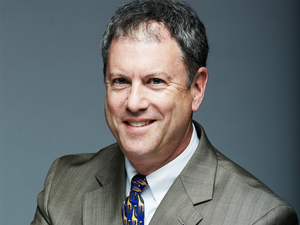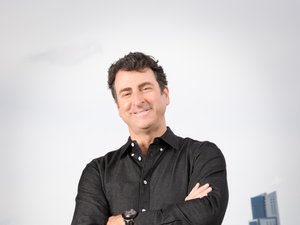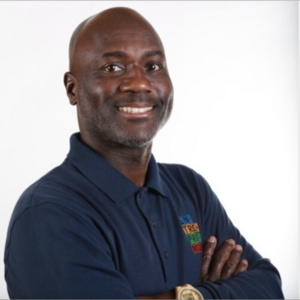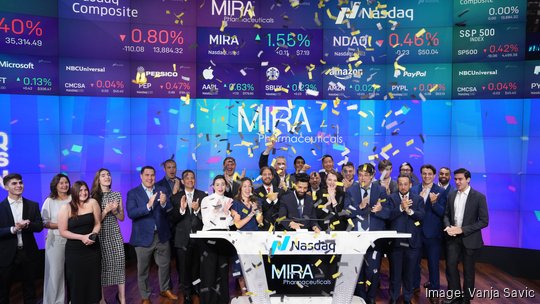
Executives for a Baltimore cannabis pharmaceutical company rang the opening bell on the Nasdaq Exchange on Wednesday, two days after closing the company's nearly $9 million initial public offering.
The biggest surprise of the day for CEO Erez Aminov was that ringing the bell to open the day of stock trading didn't even involve a bell.
“It's a touchscreen,” Aminov said. “I'm not even in control of ringing the bell.”
MIRA Pharmaceuticals (NASDAQ: MIRA) raised $8.9 million from its IPO, nearly $2 million more than the $7.1 million the company hoped to raise. The Baltimore drug developer is planning to create a synthetic alternative to cannabis that will be Food and Drug Administration-approved and available across the country regardless of local cannabis laws.
MIRA had an initial IPO price of $7 a share and when it began trading on the Nasdaq on Aug. 3, its shares went as high as $7.98 before closing at $7.42. Shares closed at $7.08 on Tuesday and were down to $6.93 in mid-afternoon trading Wednesday. The company is still in the pre-revenue phase as it waits for FDA approval and before the IPO had $1,349 of cash on hand and $397,580 of total assets as of March. The company incurred a net loss of $7 million in 2022.
The proceeds from the IPO are intended to give the early-stage pharmaceutical company the runway to last until 2024, according to a filing the company made with the Securities and Exchange Commission. The company sold 1.28 million shares and underwriter Kingswood Capital has an option to buy an additional 191,000 shares at the IPO price. An underwriter serves as the intermediary between the company issuing shares in an IPO and the investors. The company decided to raise money by going public instead of pursuing additional venture capital in order to bring awareness of its flagship MIRA1a drug to the general public.
Aminov said MIRA plans to start human trials of the drug in 2024 after the FDA approves an investigational new drug application. The company has completed some preliminary trials of the MIRA1a in mice that have shown promise in improving cognition and anxiety. The growing elderly population of the United States is a key target for the drug. Many senior citizens have turned to cannabis because of its anti-anxiety and pain-killing properties, but some physicians are concerned about the cognitive impacts of the plant. Aminov hopes MIRA1a can offer the growing population of people interested in cannabis the anti-anxiety effects of the plant while also providing cognitive benefits, something that would differentiate the drug from the plant and from traditional anti-anxiety medications like benzodiazepines.
"When you have dementia symptoms it causes anxiety. You're forgetting where you put your keys, you're suddenly not functioning the way you were before dementia, you have a certain level of general anxiety," Aminov said. "What are [those patients] taking? They're taking Xanax and other benzos that are actually counterproductive to their cognitive state. So why not have a drug that can treat those patient populations' anxiety while helping their cognition?"
MIRA is headquartered at Johns Hopkins Science at Technology Park in East Baltimore and is closely linked to another Baltimore public company, MyMD Pharmaceuticals. Chief Science Officer Adam Kaplan and executive chairman Chris Chapman also work at MyMD and Aminov is the fiancé of MIRA and MyMD Pharmaceuticals founder Jonnie Williams’ daughter, according to the SEC filing announcing the public offering. Aminov was an early investor in MIRA when it was a private company and later worked as a consultant for the company before becoming an executive.
The company has several other connections with Williams. Williams' patent holding company will receive an 8% royalty from any sales of MIRA1a. MIRA also paid Supera Aviation, a company owned by a trust established by Williams, $2.9 million for aircraft services between 2021 and the first quarter of 2023. The company terminated its lease with Supera in March. The entire raise of the IPO will go toward clinical work and the company is operating with a small staff to limit costs, Aminov said.
